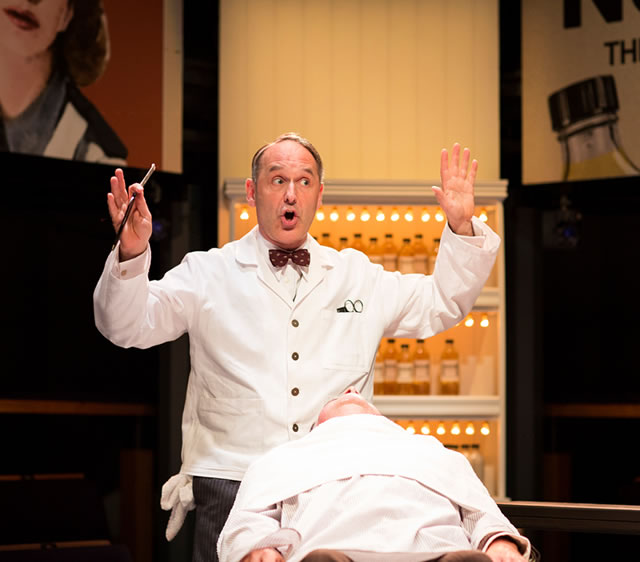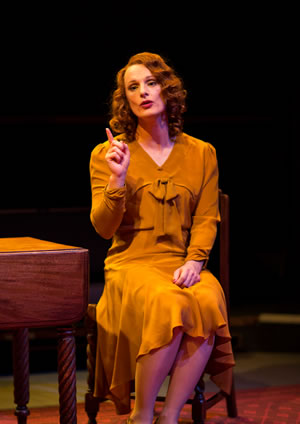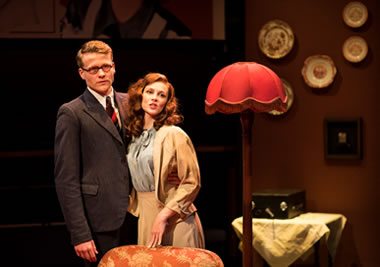Sheppey - At The Orange Tree Theatre, Richmond
Liz Vercoe discovers an enthralling production with a contemporary twist

John Ramm as Sheppey
Somerset Maugham's voice from beyond the grave tells us little has changed in attitudes towards the poor in this enthralling production with a contemporary twist.
Will we ever give up the concept of the deserving and undeserving poor? A notion invariably defined by people who are not poor and who have positions of authority and so are terribly biased. It was certainly dominant during the depression in 1933 when Somerset Maugham wrote and set this, his last play. And many of the opinions that come out of his actors' mouths are scarily and publicly still voiced in 2016.

Dickie Beau as Bessie
You can certainly sit back and enjoy this deceptively gentle play at that level. It opens in a smart barber shop in London's fashionable Jermyn Street where we meet jovial Sheppey, long-time employee and natural Jack the lad. He banters with the self-satisfied clients, sells them bottles of hair hope and buys a weekly lottery ticket to maintain his dream of his name over the door and a cottage by the sea. As Sheppey, the wonderful actor John Ramm gives us an adorable, hopeless romantic of a man whose goodness we long to believe in. No one is disappointed when lady luck comes up with a major monetary prize for him, certainly not his colleagues, the manicurist Miss Grange (Katie Moore) and proprietor Mr Bradley (Geff Francis).
Only there is now a fly in the hair unguents. Sheppey has spent the day in court after doing his civic duty and reporting a crime. He has come away with a new view of "them": the low life, the law breakers, the underclass. He sees hunger, physical hunger, as the root of their problems. He now sees people just like himself but without luck on their side or anyone to help them.

Josh Dylan and Katie Moore as Ernie and Florrie
The solution he comes up with, after suffering some form of seizure, brings his world crashing down about his ears. Simply by him threatening the status quo, his friends and family turn on him as savagely as if he was threatening their lives not just their way of thinking. His social-climbing daughter Florrie (also Katie Moore) fears not being able to buy herself out of her working class background. Similarly her fiancé Ernie (Josh Dylan making an impressive stage début), while spouting social values sees his real ambitions potentially thwarted. Sheppey's sweet and loyal wife, played by Sarah Ball, doesn't feel threatened but she "knows her place" and is ready to believe anyone with an education, eg the doctor, who thinks he's bonkers. "Sanity means doing everything everybody else does. That's the basis of democracy," runs Maugham's line. Even light-fingered crook Cooper is unnerved by the help he receives from Sheppey, because "it's not normal".
For the first act, designer Simon Daw gives us clean tiles and shiny chrome barbers' chairs, the embodiment of order and predictability, with just the posters for sweepstakes and snake-oil hair products hinting at unfulfilled dreams. In the second and third we are located in the Millers' home (Sheppey is a nickname), traditionally furnished but carpeted disturbingly with a map of the mind (best viewed from the theatre's balcony seats). And here we discover we are watching a play which has much more complex, modern take, teased out of Maugham's lines by the theatre's artistic director Paul Miller.
Bisexual Maugham, who was married, had long-term male lovers, a daughter, a stammer and endless secrets that would have deemed him mentally ill at the time. Instead, these truths have to slip out between the lines of this play like light between the shutters. It's no accident that Sheppey tells us that the psychiatrist has asked him if he ever saw his father in the bath. In 1933 psychiatry was in its infancy and often misused.
This is no simple revival of a period play. It's a version that challenges us to continue to challenge our assumptions. Even some race- and gender-neutral casting helps. It reinforces Bradley being patronised by his 1933 gentry clients, despite his success. Similarly, tart-with-a-heart Bessie Legros, who is ominously nearby from the moment Sheppey has the first of his collapses, is played with spectral poise by actor Dickie Beau. And when Bessie, in male clothes and pearls, eventually visits Sheppey and reveals the real reason for being there, our treasure-in-heaven-seeking hero is innocently unaware of any difference. Unlike the audience. This pint-sized production does full justice to Maugham's bravest of play-writing.
Liz Vercoe
Photographs: Helen Maybanks
November 30, 2016
Related links
|